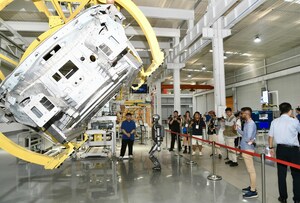Beijing Review: Understanding China through its leader's voice
BEIJING, Oct. 21, 2025 /PRNewswire/ -- In a world increasingly shaped by geopolitical suspicion and strategic mistrust, it is tempting to dismiss official documents from rival nations as mere propaganda. This temptation is especially strong when it comes to China whose political system, economic development, foreign and domestic policies are often subject to skepticisms among foreign analysts. Yet such dismissiveness comes at a cost. When China speaks, particularly through its most senior leader, it is worth listening. Not because we must accept every word at face value, but because within the lines and between them lies a roadmap of what China is thinking, planning and prioritizing.
Nowhere is this more evident than in the recently published fifth volume of Xi Jinping: The Governance of China. This volume collects 91 speeches, instructions and written remarks delivered by President Xi Jinping between May 27, 2022, and December 20, 2024. These are not casual utterances or ceremonial greetings. They are thematic, deliberate and policy rich. They offer insight into China's evolving political vocabulary, economic strategy, cultural positioning and global vision. Taken together, they present a compelling narrative of how China sees its future and how it wishes to be seen.
One of the most important takeaways is how seriously the Chinese leadership takes the concept of Chinese modernization, which is not just about GDP or skyscrapers. Xi presents it as a model rooted in China's own history, values and political experience. Unlike Western modernization theory that assumes economic development must lead to social and political changes, China's approach combines economic reform with Party leadership, social stability and cultural confidence. For China, modernization is not imitation. It is adaptation.
Western readers often question whether China's rhetoric matches its actions. But when Xi speaks of national rejuvenation, self-reliance and common prosperity, it would be a mistake to think these are empty slogans. They are statements of intent. The policies pursued under his leadership, including investing in green energy, upgrading manufacturing and promoting rural revitalization, are consistent with the themes expressed in this book. The message is not simply aspirational, it is programmatic.
Economic reform remains a central focus in this volume but with notable evolution. The traditional emphasis on rapid growth is giving way to high-quality development. This includes upgrading the industrial chain, fostering homegrown innovation, ensuring energy security and improving income distribution.
These speeches reveal how the leadership is consciously managing a transition from quantitative expansion to qualitative improvement. At the core of this shift is the belief that China must reduce its external dependencies, particularly in key technologies and supply chains.
Foreign observers often question whether China is truly opening-up or closing-in. The answer from these speeches has clarified that China is continuously pursuing openness especially in sectors where it sees a comparative advantage or strategic opportunity. But that openness is now conditionally hedged by concerns about national security and ideological cohesion. As Xi makes clear, openness must never come at the expense of sovereignty or systemic integrity.
As the world confronts a more advanced China, it is essential to understand how China sees itself. The fifth volume of Xi Jinping: The Governance of China is not a neutral academic text, but neither is it a hollow propaganda exercise. It is a declaration of intent of vision and principle. To read it is to listen to the voice of China's most senior leader's visions. To ignore it is to misunderstand the very forces shaping the 21st century.
In a time of growing uncertainty, genuine understanding is the foundation of any constructive relationship. This book offers that opportunity. We should take it.
The author is president of the America China Public Affairs Institute, a fellow of the Foreign Policy Association, and senior advisor to the China-U.S. Exchange Foundation
Copyedited by G.P. Wilson
Comments to [email protected]
https://x.com/BeijingReview/status/1963230382649721034/photo/1
http://www.bjreview.com/Opinion/Voice/202509/t20250901_800413533.html
https://tdminews.com/understanding-china-through-its-leaders-voice/
SOURCE Beijing Review

WANT YOUR COMPANY'S NEWS FEATURED ON PRNEWSWIRE.COM?
Newsrooms &
Influencers
Digital Media
Outlets
Journalists
Opted In






Share this article